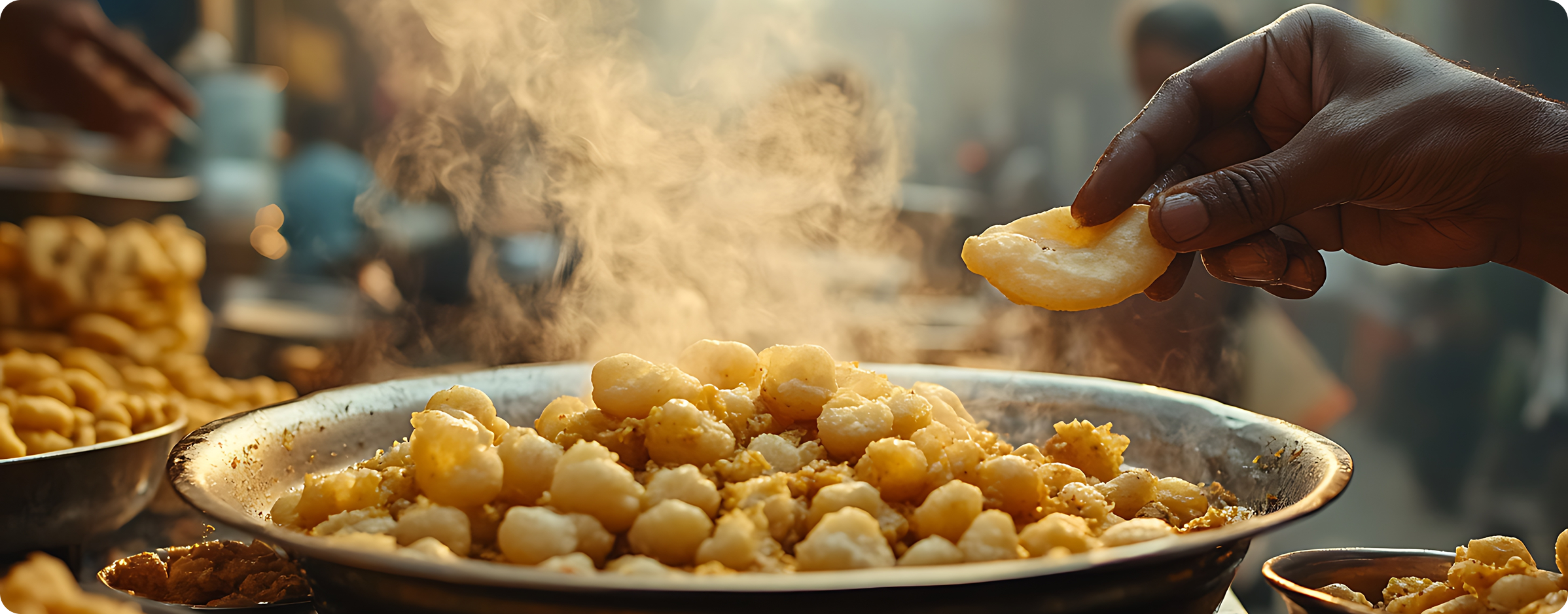Can you get typhoid from street food?

Typhoid fever is a bacterial infection that is transmitted through the consumption of contaminated food and water. The bacteria responsible for typhoid, Salmonella typhi, live in human intestines and can spread only when the infected (or sometimes even recovered individuals) ‘shed’ the bacteria via stool or urine. From there, it spreads from person to person through contaminated food or water.
How does typhoid spread?
Usually, food and beverages become contaminated by Salmonella typhi when prepared by an infected person with poor personal hygiene. For instance, the infected person may have used the washroom, not washed their hands, and then proceeded to make a meal or a drink for others. This is how you can get bacteria in your food. In some other cases, water can become contaminated when it comes in contact with sewage.
Suggested Read – The power of WASH and vaccination
The risks of eating street food
Food prepared at home is generally considered safe for consumption, while street food is riskier. While this is not always the case (as typhoid can also spread at home), home-cooked meals generally follow stricter food hygiene practices, while street food can sometimes be prepared under compromised hygiene standards.
Street food is more prone to contamination. Often, the water that street vendors use is either unfiltered or not boiled. Even if they use safe-to-drink water, the persons preparing the food might not have washed their hands before cooking. Sometimes, the water used to wash utensils may be unsafe. In some cases, street food vendors operate in less sanitary locations, such as footpaths or roadsides.
A lot of street food vendors also display their food on shelves. While this is usually done to make it look appetising, keeping food in the open exposes it to flies, which are potential carriers of typhoid.
What can I do to keep myself safe?
Fortunately, there are certain safe eating habits that we can follow to prevent the risk of typhoid while consuming street food.
1. Avoid cold or lukewarm food
Make sure that the food you are eating has been properly cooked and is served to you hot. Avoid places where the food is cooked in advance and reheated before serving it to you.
2. Avoid raw fruits and vegetables
Stay away from fruits and vegetables that are cut and sold without being washed thoroughly. These may become contaminated while preparing. If you want to eat fruits, opt for fruits like bananas and oranges that can be peeled before eating.
3. Avoid undercooked food
Raw or undercooked eggs, meat and fish carry the risk of contamination. Make sure anything that is served to you is freshly prepared and thoroughly cooked.
4. Avoid drinking unfiltered water
Since typhoid is a waterborne illness that spreads through contaminated water. It is imperative to drink clean water. If you are unsure about the quality of water, drink only boiled or bottled water. Try to ensure that the food you are eating is also prepared using filtered, boiled or mineral water.
5. Avoid drinks containing ice
Unless you are sure of the water that is used to make the ice cube, avoid drinks that contain ice cubes. Hot drinks like tea or coffee might be a safer alternative.
6. Avoid unpasteurised milk and milk products
Avoid sweets, drinks and dishes made from unpasteurised milk. If possible, ensure that the milk being used is from a packet (showing that it’s pasteurised).
7. Consider getting vaccinated
In places where typhoid fever is common, considering a vaccination for typhoid is a good way to prevent infection. Speak to your doctor to find out which one is best suited for you.
Conclusion
While street food can be tempting, it does come with certain risks. Since typhoid fever transmission happens through contaminated food and water, it’s important to be mindful of where and what you eat. Following basic hygiene practices like washing hands, eating freshly cooked food and drinking filtered water can go a long way in keeping you safe. When in doubt, choosing home-cooked meals or dining at places with proper hygiene standards can help reduce the risk. Getting vaccinated further reduces the risk of typhoid. A little caution can go a long way in protecting yourself from typhoid and other foodborne diseases.
Resources
Disclaimer: A public awareness initiative by Bharat Biotech International Limited. This information is for general awareness only and does not constitute medical advice. The doctors, medical facilities and graphics shown are for illustrative purposes only. For any medical advice or any question or concern you may have regarding your condition, consult your doctor.


